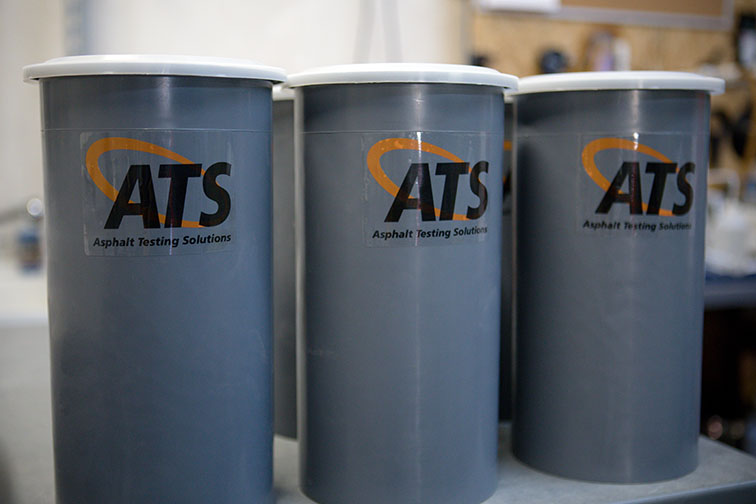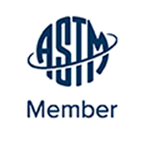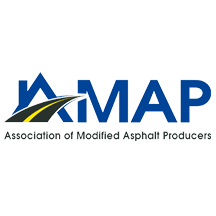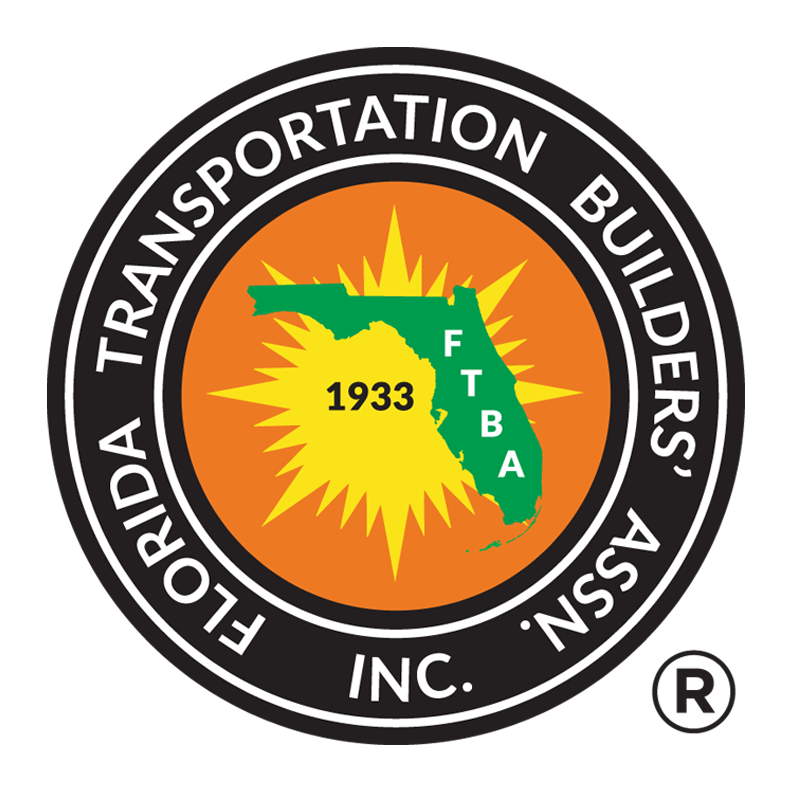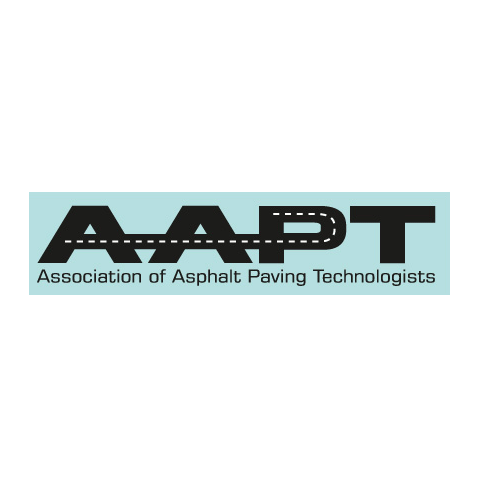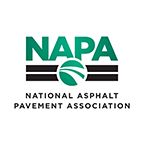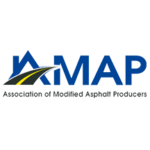We know one of the biggest pain points for asphalt contractors is battling segregation in the mix. We could discuss the potential causes of segregation and how to fix them for hours, but check out our short animated video. We illustrate common causes of segregation on both the paving side and production side!
Local Contractors
Asphalt Quality Control
Asphalt Manufacturing
Asphalt Quality Control responsibilities belong to the asphalt contractors and is in place to show they provide quality products with results for acceptance. ATS technicians can assume asphalt quality control responsibilities and will test the asphalt as it is produced to ensure the end product meets state or customer specifications. The process may include:
- Properly collecting samples from the trucks immediately following load-out
- Monitoring actual mixing temperatures at the plant
- Verifying liquid asphalt content
- Identifying volumetric properties of compacted asphalt specimens and the specific gravity of the asphalt mix
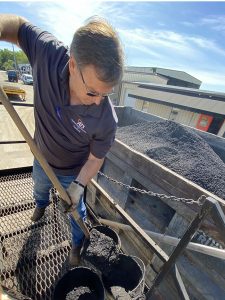
Asphalt Paving
During construction ATS technicians run testing on asphalt as it is placed in the field. The process may include:
- Verifying proper rolling patterns are employed
- Monitoring roadway temperatures
- Calculating tack, dilution and spread rates
- Checking density after the asphalt paver lays the asphalt mix and after each roller pass
- Cutting asphalt core samples to check for actual density results
- Ensuring acceptable quality practices are followed
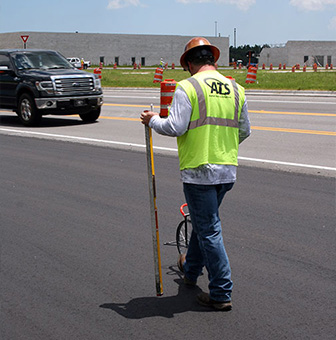
Asphalt Quality Assurance
Quality Assurance is the continued evaluation of planning, design and the development of plans and specifications to provide confidence that the product or facility will perform to standards. This is provided through an unbiased, independent review of all operations, procedures and equipment used in the asphalt quality control process. This is achieved by:
- Observing and inspecting procedures during production and placement
- Split sample testing
- Evaluating performance and qualifications of the technicians
- Verifying equipment is calibrated and in proper working condition
- Conducting project oversight
- Reviewing reports and results for accuracy per the project’s requirements
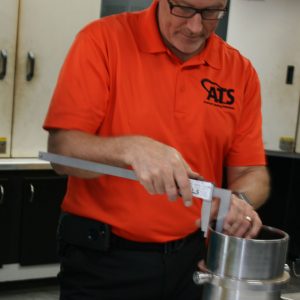
Asphalt Coring & Testing
An asphalt core testing procedure is a precise tool used during new construction to verify quality as well as a tool to evaluate existing asphalt pavements for potential problems. Asphalt cores provide the most accurate in-place information. The asphalt core sample can determine:
- Pavement thickness
- Bond between pavement layers
- Soil type under pavement
- Drainage
Asphalt Testing Solutions & Engineering laboratories and technicians are FDOT and AASHTO materials certified. Our technicians provide asphalt testing services for Marshall and Superpave mix among others.
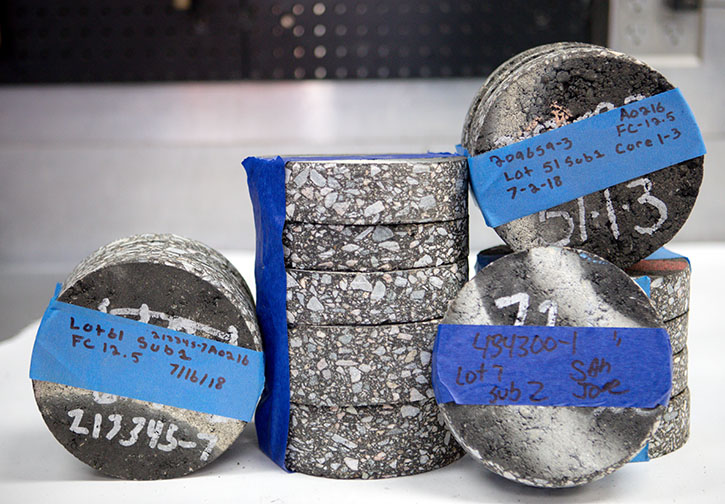
Tests include:
- Superpave Gyratory & Marshall Compaction
- Marshall Stability & Flow
- Hamburg Wheel Tracking Test
- Bond Shear Testing
- Mixing & Compaction Temperatures
- Asphalt Mix Designs
- FAA P-632 Testing
- Liquid Anti-Strip Approval & Research
- Semi-Circular Bend Test
- Tensile Strength Ratio (TSR)
- RAP & RAS Analysis
- Binder Extraction / Recovery
- Consensus & Source Properties of Mineral Aggregates
- Pavement Coring & Testing
Asphalt Engineering Analysis
 When you find yourself in the middle of a job and your asphalt materials are found to be non-compliant, an Engineering Analysis Report (EAR) may be required. Our in-house professional engineer, backed by our team of experienced specialists, will conduct a thorough analysis of your asphalt materials or product and determine possible causes of non-compliance:
When you find yourself in the middle of a job and your asphalt materials are found to be non-compliant, an Engineering Analysis Report (EAR) may be required. Our in-house professional engineer, backed by our team of experienced specialists, will conduct a thorough analysis of your asphalt materials or product and determine possible causes of non-compliance:
- Scope of work
- Develop testing plan
- Testing, analysis and reports
- Professional recommendations
Asphalt Mix Design
The certified Mix Designers at ATS incorporate the correct mix components for the most cost-effective mix designs to support our customers’ needs. Including Superpave, Marshall, FAA and pavement preservation mix designs, our team has produced over 1000 approved designs. Over the years mix design has evolved from a simple recipe approach to a more detailed analysis procedure and our designers and technicians will test the designs to ensure the proper volume of air voids and asphalt binder are mixed for stability and durability, as well as use a balanced mix design approach to meet the fine line between rutting and cracking.
